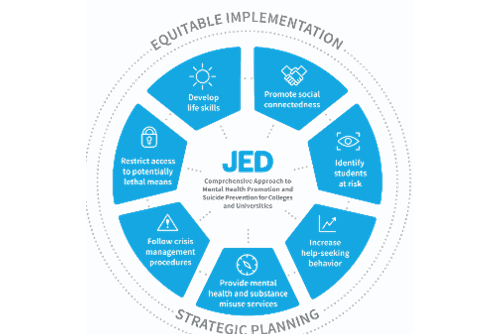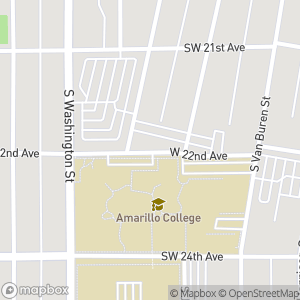Amarillo College is a JED Campus
In 2023, Amarillo College partnered with the Jed Foundation (JED), a leading nonprofit organization dedicated to promoting emotional health and preventing suicide among young adults. The JED Campus Fundamentals program is an 18-month program in which Amarillo College embarked upon a journey to assess mental health promotion and suicide prevention efforts on campus and outline opportunities for improvement.
The JED Comprehensive Approach
JED Campus believes in a comprehensive, public health approach to promoting emotional well-being and preventing suicide and serious substance misuse. This model is used to assess efforts currently made on campus, identifying existing strengths and areas for improvement.

 Develop Life Skills
Develop Life Skills
Supporting life skills education is valuable in teaching healthy ways to cope with the stress of college life. Some of the life skills that are important to a student's well-being include managing friendships and relationships, problem-solving, decision-making, identifying and managing emotions, healthy living, and finding life purpose, meaning and identity.
 Promote Social Connectedness
Promote Social Connectedness
Research has shown that loneliness and isolation are significant risk factors for mental health problems and/or suicidal behavior. Therefore, supportive social relationships and feeling connected to campus, family and friends are protective factors that can help lower risk.
 Identify Students at Risk
Identify Students at Risk
It is important to take action to identify students at risk for mental health problems and/or suicidal behavior, and also to promote emotional health awareness among those who interact with students the most — “gatekeepers” such as residence hall staff, academic advisors, faculty and even fellow students — as it is vital for these people to be able to recognize and refer a student who might be in distress.
 Increase Help-seeking Behavior
Increase Help-seeking Behavior
Many students who need help may be reluctant or unsure of how to seek it out. Obstacles to help-seeking include lack of awareness of mental health services, skepticism about the effectiveness of treatment, prejudices associated with mental illness and uncertainty about costs or insurance coverage. Campuses should engage in a variety of activities designed to increase the likelihood that a student in need will seek help.
 Provide Mental Health and Substance Abuse Services
Provide Mental Health and Substance Abuse Services
It is essential to offer accessible, consistent and high-quality mental health services to students. To make mental health and substance abuse care more comprehensive, it should include strong and flexible services, adequate staffing levels, flexibility in treatment approaches and clinic hours that are reflective of student schedules. Since most college clinics are free, the length of treatment is often limited. Therefore, it is important that campus mental health services assist students in finding off-campus resources that can provide long-term care if needed.
 Follow Crisis Management Procedures
Follow Crisis Management Procedures
The campus should have access to a well-publicized 24/7 crisis phone and/or chat line either through campus resources or local/national services. There should be a process in place to share information (as legally appropriate) between local Emergency Rooms and school health and/or counseling services.
 Restrict Access to Potentially Lethal Means
Restrict Access to Potentially Lethal Means
It has been well established that if the means to self-harm are removed or limited in an environment, it can prevent suicide and even limit accidental deaths. This is called “means restriction.” Limiting students' access to weapons, poisonous chemicals, rooftops, windows or other high places are all means restricted activities. Each campus should do an environmental scan for potential access to lethal or dangerous means.
JED Foundation. “Our Comprehensive Approach.” https://jedfoundation.org/our-approach/. Accessed 24 July 2024.
Amarillo College JED Actions
- Conducted the JED campus assessment and developed strategic priorities in regard to student mental health and well-being.
- Interdepartmental professional development and learning around current student mental health and well-being needs, including key members in academic affairs, student affairs, strategic initiatives, and the crisis intervention team.
- Initiated the Active Minds student organization for peer support.
- Expanded "Mental Health First Aid" and "You Can Help" trainings for Amarillo College students.
- Expanded awareness efforts on promoting access to mental health services on campus.
- Implemented mental health screenings on the college website.
JED Next Steps
- Re-administration of the Healthy Minds Study after key initiatives of TimelyCare, the Panhandle Partnership Clinic, and JED action plan.
- Policy reviews and implementations involving mental health, substance use, crisis, and postvention efforts.
- Bolster support for developing life skills and promoting social connectedness.
- Expand current resources to decrease stigma, encourage help-seeking actions, and provide equitable access to care.
Contact Us
Office Hours
Monday-Friday: 8:00am - 5:00pm
Appointments
Emergency Contact Information
If you are experiencing an emergency situation, please call one of the following:
- 911 – National Emergency Hotline
- 988 – Suicide and Crisis Lifeline
- (806) 371-5911 – Amarillo College Police Emergency
